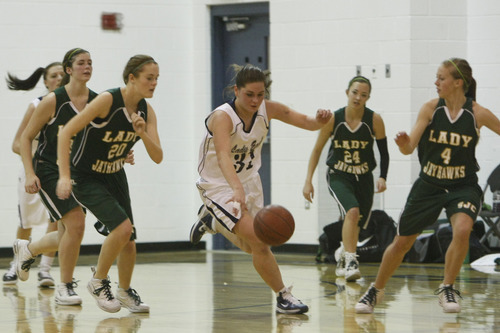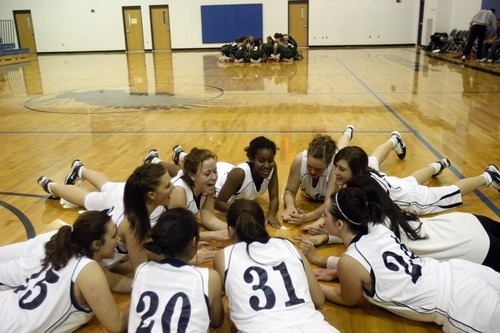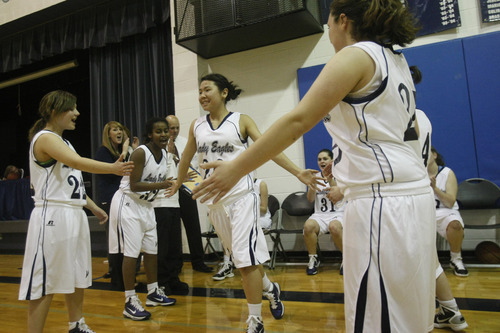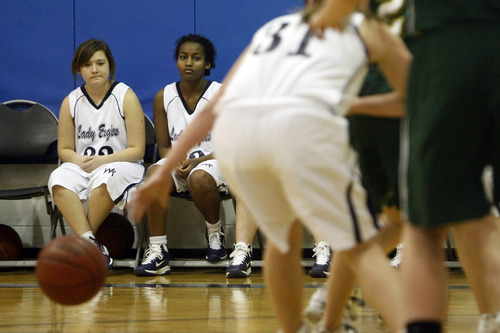This is an archived article that was published on sltrib.com in 2011, and information in the article may be outdated. It is provided only for personal research purposes and may not be reprinted.
West Jordan • It's only the first quarter, but everyone who has come to the girls' basketball game at West Ridge Academy knows the hometown Eagles are going to lose.
The fans, the coaches, the players — they all are certain about the eventual result: The Eagles have lost every game this season by 38 points or more. Almost everyone on West Ridge's roster is playing organized basketball for the first time.
So when Carli Perkins drives inside and throws up a shot that rattles into the hoop and sinks through the net, cutting St. Joseph's lead to 4-2, it's a big statement. It will be the smallest margin between the two teams all night.
By the second quarter, West Ridge has four points, all scored by Perkins. She's the Eagles' best player, meaning she's actually played basketball before.
"I've always liked basketball," the sophomore point guard says. "It's a great distraction that really helps me forget everything else that's going on."
Perkins joined a Junior Jazz team in middle school, but had to quit the team because her grades were slipping, she says. It's one of the reasons Perkins is at West Ridge Academy, a private boarding school for children and teenagers who have behavioral problems, family issues or who struggle with substance abuse.
The school puts students through a strict regimen of academics and therapy for about 10 months. The Eagles miss shots, throw errant passes and sometimes struggle while dribbling.
But they're out there — perhaps not talented but focused — moving the ball, waving their arms on defense, and doing the best they can despite an imminent blowout.
"When we're on the court, we just let everything else go — just the drama, the family stuff, whatever's going on," says Jessica Christensen, a captain who never played organized sports before this season. "Sometime it's hard to come from therapy into practice, but you have to forget about it."
Sportsmanship issue?
In the third quarter, the Eagles score only one point. St. Joseph coach Joe Cravens has instructed his team to work on its half-court offense. No layups are allowed.
Everyone is trying to avoid what happened Tuesday night: Christian Heritage 108, West Ridge 3. The score is believed to be the largest margin of victory in any basketball game ever played between Utah high schools.
"I don't know why the score was that high, or what the point was," says Jamie Keefer, West Ridge's athletic director who is also a coach for the girls' team. "I don't think it would've happened that way if it were the other way around."
Christian Heritage coach Robert McGill defended himself and his players in an e-mail to The Tribune. While he said the team ran mostly secondary sets and wrinkles in his playbook, he felt benching his starters or telling them not to compete would have been more insulting to West Ridge than what happened.
The important thing, he wrote, was that his team treated West Ridge with encouragement and respect, and the Eagles kept trying to chip at the score.
"Every time my team was shellacked by 60 points, I used it as a motivation opportunity," he wrote. "Players need to sink or swim. They must focus on getting better so that this never happens again. … The bottom line is that we must show respect and sportsmanship in all things we do. So maybe the real question is, is the score differential tied to sportsmanship or how the teams treat each other during the event?"
The 108-3 game provoked discussion of implementing a point-differential rule — known as a "mercy" rule — in a Region 17 meeting between athletic directors Wednesday. Keefer says it might be a good idea someday, but until then, his team won't play with any customized running clock rule and won't seek an apology from Christian Heritage.
Both schools say they've moved on from the game and hope to continue a good relationship.
The Eagles players say they tried their hardest — they're not embarrassed.
Beyond the scoreboard
It's the fourth quarter. The game is out of reach.
West Ridge is used to getting beat. It's one of the reasons some of the players don't look at the score — they keep their heads down and keep playing.
"Sometimes the score doesn't show everything. Sometimes all you can give is your fullest, " Perkins says.
But the Eagles keep fighting.
The girls' basketball program at West Ridge aims to win, but it's as much therapy as it is competition.
Trust is a huge currency at West Ridge, and the team builds it every day in practice. They do group therapy sessions, and learn to share more than just the ball.
"We have a saying based on a poem that we use: 'Hold the rope,' " Keefer says.
"It basically is meant to remind them if their teammate was dangling from a rope, would you grab it? When the score gets bad, they play for each other."
The game's final score: St. Joseph 66, West Ridge 16. The Eagles' point total matches their second-best of the season.
Of course, there are days when players can get overtaken by frustration, Christensen says. There are days when losing really does sting, and when turning around their lives seems like a Herculean task.
Her teammates and coaches hold the rope on those days. They pull her out of her funk, and she walks up to the other team to shake hands.
"It's really important to have sportsmanship," she says. "It makes basketball fun."
kgoon@sltrib.comTwitter: @kylegoon —
Should the UHSAA adopt a basketball mercy rule?
After Christian Heritage defeated West Ridge 108-3 last week, Region 17 athletic directors discussed a possible point-differential rule, known popularly as a "mercy rule." The Utah High School Athletic Association has the power to implement a rule of its own design, under the guidelines of the National Federation of State High School Associations. There are such rules for football and baseball in Utah. This is what some people had to say about a possible point-differential rule for Utah basketball teams:
Kevin Dustin, assistant director, UHSAA • "We'd have to present a proposal to the executive board, and then they'd go poll their principals to see if there is a need for it, just like any other policy. ... It's something we could possibly discuss soon."
Jamie Keefer, athletic director, West Ridge • "In 1A competition where there's less parity, maybe we do need a rule. Maybe a running clock would help those situations when it does fall back on the coach a little bit more."
Paul Keene, principal, West Ridge • "There will be no policy changes. ... Sometimes these games are lopsided affairs. It's the nature of the game."
Robert McGill, girls' basketball coach, Christian Heritage • "I hate the idea. I always want a team to play me straight up. ... This is the only way I can diagnose my team's mistakes and teach them how to get better."
Kelly Volk, athletic director, Christian Heritage • "I believe we might support a rule like that. ... It might be helpful for the state to guide us so it's not a player, coach or official decision."
Joe Cravens, girls basketball coach, St. Joseph • "This game seems like as isolated incident. Sometimes it happens that way. I don't think we need a rule for it."
Kyle Goon









